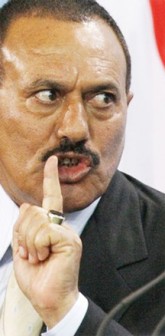SANAA (Reuters) – Yemen’s president said yesterday his country would descend into civil war if he were forced to quit and Washington voiced concern about instability in the Arab state that has become an al Qaeda stronghold.
Seven weeks of unrelenting anti-government protests and defections among the ruling elite have piled pressure on Ali Abdullah Saleh, a US ally against radical Islamist ambitions in the Arabian peninsula, to step down immediately after 32 years in power.
But an aide said he would leave office only after organizing parliamentary polls and establishing democratic institutions, by January 2012 — a declaration the opposition promptly rejected.
“Ali Abdullah Saleh does not seek power,” Saleh’s media secretary Ahmed al-Sufi told Reuters. “Ali Abdullah Saleh will not leave without knowing who he is handing over to.”
The United States, grappling with the diplomatic fallout of uprisings and uncertainty across the Arab world, voiced rare public alarm about the situation in Yemen.
“We are obviously concerned about the instability in Yemen,” U.S. Defense Secretary Robert Gates said. His chief concern was to avoid “diversion of attention” from opposing al Qaeda there.
Opposition spokesman Mohammed al-Sabry, rejecting Saleh’s offer to go by January 2012, said the coming hours would be decisive.
In speeches to army officers and tribal leaders in Sanaa, Saleh said Yemen faced a danger of civil war and disintegration because of efforts to stage a “coup” against his rule.
the country, the country will be divided into three instead of two … (parts). A southern part, northern part and a middle part. This is what is being sought by defectors against … unity,” he said, referring to northern Shi’ite rebels and al Qaeda militants.
“Those who want to climb up to power through coups should know that this is out of the question. The homeland will not be stable, there will be a civil war, a bloody war. They should carefully consider this,” Saleh told army commanders.

Presidential guards loyal to Saleh surrounded an air force battalion in the coastal city of Hudaida after its commander said he supported the protesters. A presidential guard and a soldier died in clashes between the two forces in the southern coastal city of Mukalla late on Monday, medical sources said.
In southern Abyan province, troops clashed with al Qaeda militants, killing 12 and wounding five, state media said.
Liquefied natural gas producer Yemen LNG has told customers that unrest could lead to supply disruptions, leading stakeholder Total said.
Western countries fear the political crisis could hasten a slide into failed nation status for a country that borders the world’s biggest oil exporter, Saudi Arabia, and major shipping routes. One scenario could see the country split into separate zones along tribal, military or regional lines.
Al Qaeda has already used Yemen to attempt attacks in Saudi Arabia and the United States in the past two years. The Shi’ite Houthi movement has staged a number of revolts against Saleh.
One opposition leader offered Saleh the prospect of secure retirement if, like Egyptian President Hosni Mubarak, he would go quietly, unlike Libyan leader Muammar Gaddafi.
“He shouldn’t follow the style of Gaddafi by destroying the country and killing people,” Yassin Noman, rotating head of Yemen’s opposition coalition said.







